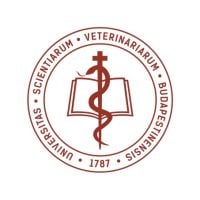The University of Veterinary Medicine Budapest is the only veterinary school in Hungary. It is accredited to issue the diplomas of Doctor of Veterinary Medicine (D.V.M.), Bachelor of Science (BSc) and Master of Science (MSc) in Biology, and the postgraduate degree of Philosophiae Doctor (PhD) in veterinary sciences. The University has a fundamental role in teaching the course of undivided (one-tier) in zoology, too. The University has an uninterrupted teaching record for more than two centuries, making it thus one of the oldest veterinary schools in the world.
Hungary, owing to its plain territories particularly suitable for extensive animal breeding, has always been a large-scale producer and exporter of animals and animal products. From the late middle ages, large herds of cattle and other livestock were driven to the markets of Vienna, Nuremberg, Munich, and the North-Italian municipalities, where Hungarian livestock, particularly horse and cattle, sold well. The several weeks-long migrations to the marketplaces were rather trying for both the animals and the accompanying mounted herdsmen who knew where to find pastures with fresh grass and water on the way. They have also experienced warriors capable of defending their valuable goods (and the money on the way back) from the attacks of robbers. This traditional kind of trading lasted until the 16th century, when the expanding Turkish Empire turned the territory of the Hungarian kingdom into a battlefield for the next 150 years.
When the Turks were expelled, a devastated country was left behind. In the late 17th century, Hungary became a condominium with Austria under the Habsburg Emperors. The old commercial routes were revitalized but this time, Hungarian livestock and their warlike herdsmen were needed also for the Imperial Army: meat for supplies, horses and horsemen for making the core of the famous Hungarian light cavalry, the “Hussars”. To this end, enlightened sovereigns of the multinational empire found it necessary to develop a basic infrastructure in Hungary, the domain where their meat, corn, good horses and soldiers came from. A part of these developments was the implementation of a countrywide educational system. New universities were opened and, in 1782 Emperor Joseph II decided to establish a school for veterinary medicine in the city Pest (now part of Budapest).

